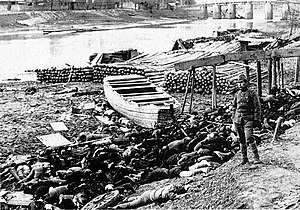Rape of Nanking
| Nanking Massacre (Rape of Nanking) | |||||||
|---|---|---|---|---|---|---|---|
| Part of the Second Sino-Japanese War | |||||||
 The corpses of massacred victims on the shore of the Qinhuai River with a Japanese soldier standing nearby |
|||||||
|
|||||||
| Nanking Massacre | |||||||||
| Chinese name | |||||||||
|---|---|---|---|---|---|---|---|---|---|
| Traditional Chinese | 南京大屠殺 | ||||||||
| Simplified Chinese | 南京大屠杀 | ||||||||
|
|||||||||
| Japanese name | |||||||||
| Kanji | 1. 南京大虐殺 2. 南京事件 |
||||||||
|
|||||||||
| Transcriptions | |
|---|---|
| Standard Mandarin | |
| Hanyu Pinyin | Nánjīng Dàtúshā |
| Wade–Giles | Nan2-ching1 Ta4-t'u2-sha1 |
| Transcriptions | |
|---|---|
| Traditional Hepburn | 1. Nankin Daigyakusatsu 2. Nankin Jiken |
The Nanking Massacre was an episode of mass murder and mass rape committed by Japanese troops against the residents of Nanjing (then spelled Nanking), then the capital of the Republic of China during the Second Sino-Japanese War. The massacre occurred over a period of six weeks starting on December 13, 1937, the day that the Japanese captured Nanjing. During this period, soldiers of the Imperial Japanese Army murdered Chinese civilians and disarmed combatants who numbered an estimated 40,000 to over 300,000, and perpetrated widespread rape and looting.
Since most Japanese military records on the killings were kept secret or destroyed shortly after the surrender of Japan in 1945, historians have not been able to accurately estimate the death toll of the massacre. The International Military Tribunal for the Far East in Tokyo estimated in 1946 that over 200,000 Chinese were killed in the incident. China's official estimate is more than 300,000 dead based on the evaluation of the Nanjing War Crimes Tribunal in 1947. The death toll has been actively contested among scholars since the 1980s.
The event remains a contentious political issue, as aspects of it have been disputed by historical negationists and Japanese nationalists, who assert that the massacre has been either exaggerated or fabricated for propaganda purposes. The controversy surrounding the massacre remains a stumbling block in Sino-Japanese relations and in Japanese relations with other Asia-Pacific nations, such as South Korea and the Philippines.
...
Wikipedia
